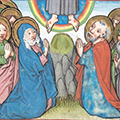Carmelite homily for Monday (Week 12), June 22, 2020 – Lectionary 371 (Matthew 7:1-5)
In today’s Gospel Jesus warns us not to judge others and the measure we measure out will be measured back to us. And he gives us the good example of why look at the speck in your brother’s eye and miss the plank in your own. But what’s the point? I think it’s to make life rich and rewarding instead of picking at each other and bringing each other down, building each other up. Saint Therese of Lisieux, who lived in a difficult Carmel, says, “A kind word or an amiable smile is often enough to make a sad soul bloom.” That’s our purpose; that’s our mission – to make a sad soul bloom. Instead of cutting them down or trampling them, make the sad soul – make all souls – bloom. That’s our vision; that’s our duty; that’s our mission.





